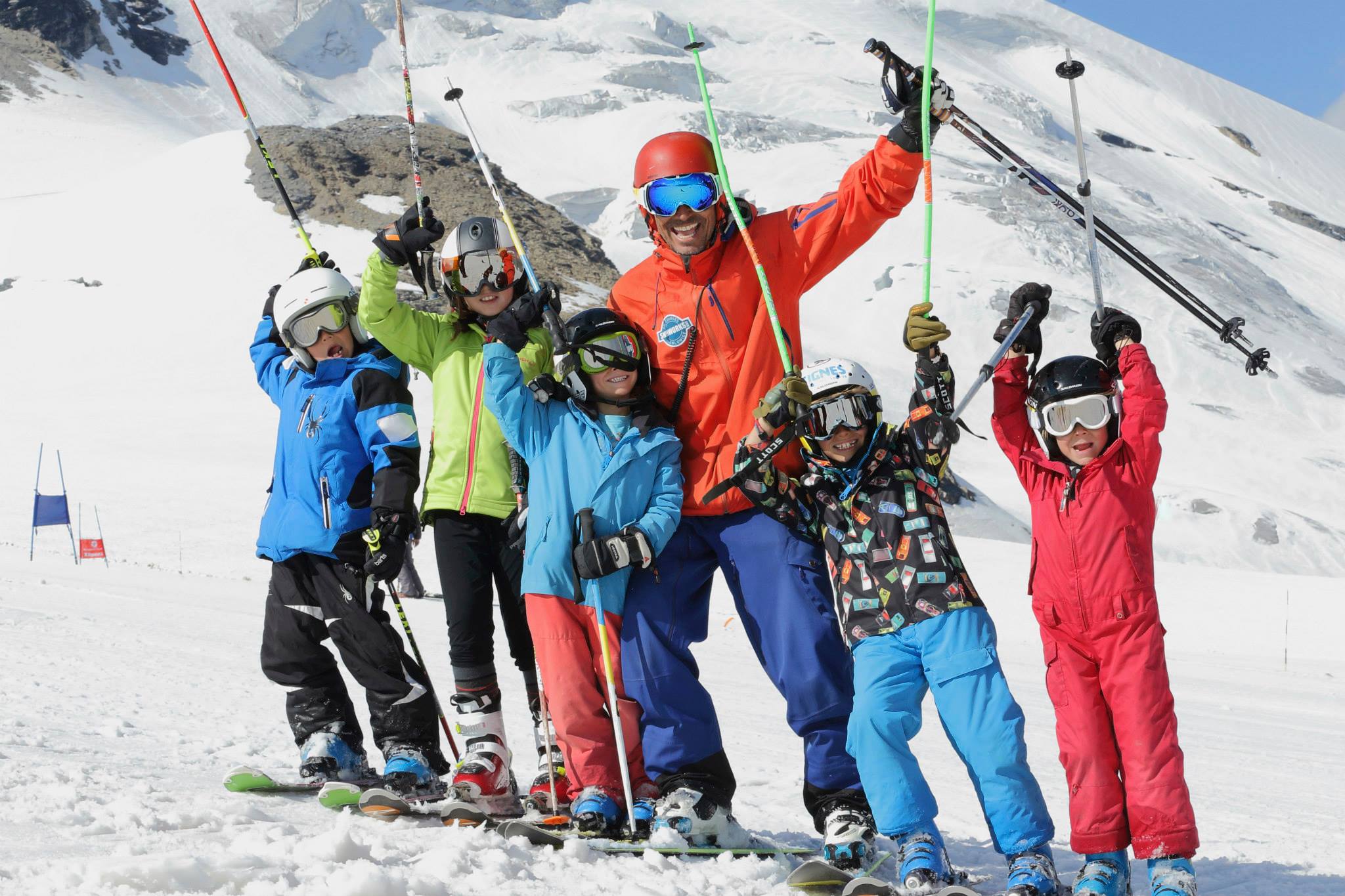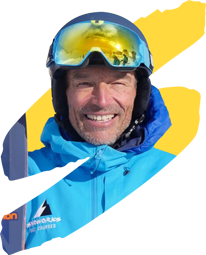
Technique or Skill?
Phil Smith, Snoworks director talks about his perception of technique and skill and his journey from judged to measured performance.
Technique, Technique, Technique. Most ski lessons are all about technique. But have you ever stopped to think “Am I actually improving”. “Yes I know I’m improving because my instructors tells me so.” But are you, how do you know for sure?
Much of ski teaching and coaching is very subjective. Subjective meaning somebodies opinion. A friend, relative, trainer, coach, instructor, partner. So it can be their opinion if you are improving. Many sports are objective, measured either by time, weight, goals, wins, against someone else or anything else that is measured. So it’s easy to know if you are improving as the performance is ‘measured’. Ski racing is measured. You can train and train and train as a racer, but what matters is your time in the race. You could have the perfect ‘technique’ but still be the slowest down the race course. On the other hand you could break every rule in the book and be the fastest. Bode Miller was a racer who broke every rule in the book and went on to become one of the greatest ski racers of all time. We see it over and over again, skiers skiing so called ‘badly’ really well and skiers skiing so called ‘well’ badly. If you can get your head around that! So much of ski teaching is not measured, it’s judged and judges vary in their opinions and often change their mind.
Technique should be for a purpose, not technique for the sake of technique. For a ski racer the purpose of technique should be to get down a course in a faster time hopefully safely. Obvious I know, but often technique is developed for the sake of technique without a measured outcome so it’s purely someones opinion as to whether you are improving. It’s judged. Many students when asked what they wish to work on, say ‘technique’ as though that is the Holly Grail of skiing. Rarely do students say I’d like to learn to cope with bumps, ski in control on ice, cope with deep snow, ski safely on steep terrain, ski faster, slow down quicker, negotiate tight spaces. All of which can be measured not judged. We’ve been lead to believe we need to develop our technique but not sure why or for what purpose.
When I learnt to become an instructor it was all about perfect technique and I went along with it hook line and sinker. I knew the manual back to front. I could almost recite word for word technical explanations straight out of the book. I assessed instructors and they needed to have perfect technique. Many trainee instructors would fail their instructor exams on their ski technique even though they may well have been more competent skiers than others who passed. Their technique was deemed incorrect. At the time we all thought we were doing the right thing. We were the judges and like many 1000’s of skiers thought ski teaching was all about technique. Yes I was a product of that system and at the time proud of it. I was a judge, giving my opinion on the way others skied.
It wasn’t long before my own students begun to defy my thoughts and perceptions, defy my judgement. Time and time again students would ski differently to my own perceptions of skiing and they skied really competently. Bummer, what am I doing wrong I thought? How can all these people ski so well, so badly, in my opinion. Now that’s a conundrum that gets you thinking. Ski well badly and ski badly well. So many skiers I met could cope with everything the mountain threw their way competently, but differently to my perceptions of how they should ski. Soon I begun to question my thoughts on ski teaching and realised for years I had been working subjectively rather than objectively. I had been giving feedback based on my perceptions of ski technique, judging rather than working towards a measured outcome. Are they coping better with deep snow, skiing more in control on ice, dealing with bad visibility, bumps and awkward places. If it’s a ski racer are they skiing faster through a course, coping with the terrain more effectively, adjusting their line when needed, can they accelerate to gain speed, slow down to manage a tricky section. My teaching gradually but surely moved towards measured performance rather than judged performance as the outcome. You see measured is measured. You can’t argue with it. Faster is faster, the time is the time, getting down a slope is getting down a slope, control is control, slower is slower, faster is faster. Judgement on the other hand is someones opinion. And the problem with opinions is they change. Change ski instructor/coach you change judge and change opinion.
The answer is to go ‘measured’. It’s a funny thing and most will think I’ve gone completely mad but to ski moguls you just need to get down them, to ski a steeper slope you just need to get down it, to ski difficult snow you just need to cope with it, to ski ice you just need to control your speed on it, to ski faster you need to ski faster, to ski slower you need to ski slower, to ski with less effort you need to ski with less effort. Experiential learning. Get stuck in, work it out, adjust and get on with it. Many skiers try to miss out this crucial part of learning. Experience. Preferring to skip all the experimenting, miss out all the trial and error and get to the final result without all that messy learning stuff. The adult brain longs to know how to do it before even trying. We end up believing if we are taught the right technique everything will happen as if my magic. Learning is messy. It’s not a straight line upwards. It’s full of troughs and peaks and it’s one hell of a wiggly line. It comes as no surprise that those who just get stuck in, work in a measured way, learn the fastest. Kids are a classic example. Trial and error, have a go, just do it. Many adults on the other hand are nervous of just having a go and understandably. We don’t want to get hurt. So we take what we believe to be the easy option – technique. It’s safe and predictable and in some cases it will appear to work when the terrain and snow is predictable. But as the terrain and snow become unpredictable things have to change.
It comes as no surprise that the classic well documented ‘Intermediate Plateau’ comes when the terrain and snow move from predictable to unpredictable. Ice, bumps, fresh snow, poor visibility, off-piste, steeper terrain, slush. It’s the point at which 100,000’s of skiers suddenly find their ‘technique’ not working.
So it comes down to the question, what is improving? In my book it’s about measured performance. We want to ski the mountain more competently. The end aim to cope with everything the mountain throws our way, competently with a smile on our face. Many skiers have lessons but end up skiing the same slopes thinking they are skiing better, have improved, but they could be skiing at the same level just differently. If you can ski Blues, what about Reds? If you can ski Reds, what about Blacks. If you can ski Blacks what about off-piste, bumps, ice, slush. If you really want to improve go measured. Slow done, speed up, go there, go here. You wont believe how quickly you can improve as your focus moves to achieving the outcome, a measured goal. Your technique develops because of your goal, rather than the other way around.
So what is ski technique? The answer to this questions depends on your perception of skiing. If skiing is about travelling around the mountain coping with the environment your answer will be completely different to someone who’s goal is to ski so called ‘correctly’. For me technique is for a purpose, a measured outcome. In all honesty I’m not keen on the word technique. For me it conjures up a fixed way of skiing. I prefer to think of skills. Skills that are infinitely variable. As variable as the mountain themselves. How is it possible for us all walk through a crowded bar carrying a tray of drinks? Because we have the skills to do it and whatever gets in our way, whatever changes, we can adjust. The crowded bar is never the same twice. Every time we walk through the crowded bar it’s different. Yet we all manage this task flawlessly. We have the skills to do this, to change to adapt, to achieve the outcome.
If you’re taking lessons and you want to improve and know you’re improving, I suggest you aim to develop skills. Skills that you can personally decide how to use when the moment arises. Skills that are infinitely variable so you can adjust them and learn how to use them through trial and error. The ski instructor is far from being redundant when it comes to helping you develop skills. We’re even more useful. We can help to develop the skills to control speed in every conceivable situation. We can help you with the skills that allow you dictate where you are going in every conceivable situation. If you’re a ski racer we can help you with the skills to accelerate and slow down at will. To accurately control your speed, to adjust to the terrain and snow texture and to choose a line at will. There are also psychological skills. Recognise when you’re nervous and have the skills to redirect your focus accordingly. Skills to concentrate, skills to change focus, skills to calm down, to up your game. There are tactical skills. If you are an off-piste skier, which line to take, how much space to leave, which slopes to avoid, where to stop safely, when to say no.
Skills are things you can use at will. Skills are things you can personally adjust and adjust infinitely. Most issues in skiing are when your movements don’t match the environment. This happens when a skier has what we call a ‘closed’ technique. A technique that is always the same whatever the conditions. In my book the Holy Grail in skiing is not technique, it’s skill. It was John Shedden who I first remember talking about skill in skiing in his ground breaking book Skilful Skiing. Boy was he right. Skill not technique. A play on words? Is skill not technique just another word for the same thing. Again this depends on your perception of skill and technique. For me it’s skill all the way and measured performance not judged. I always remember one of my young sons racing with his local club. The coach turned around and said to me “I don’t like your sons technique.” A judge in action. He won the race by seconds. We know judges get it wrong but the clock never lies. Judged or measured. Measured all the way for me.
Next time you take a lesson think. Are you developing technique or skill? Are you developing something that remains the same all the time or can you adjust it to the environment? Is your performance being judged or measured?
The mountains are infinitely variable. You have to be as variable as the mountains themselves. Go Measured, develop skills.
Have you signed up to the Snoworks Newsletter? Receive all the latest ski news. Read interesting stuff. Keep abreast of the Snoworks Ski Course Programme.
